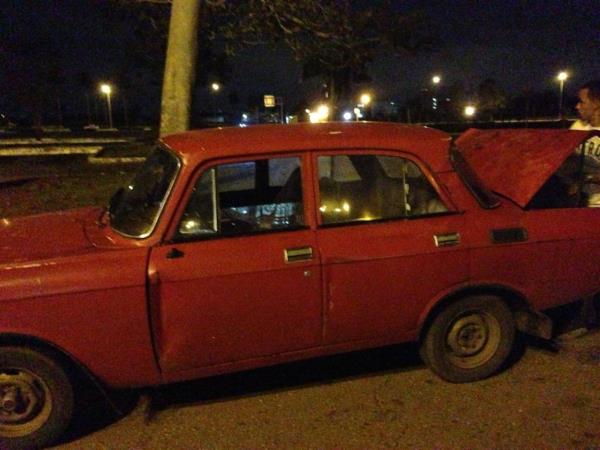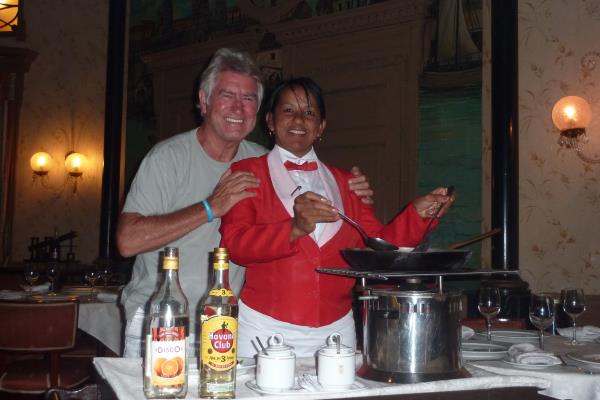Life of Brine
THE bus was two hours late. When I inquired at the travel desk of the Aguas Azule Prison Camp, the pretty girl just shrugged and said: “Cuba time.”
Fortunately, I had the chronic runs thanks to the buffet lunch, so the afternoon passed quickly. When the bus finally arrived it was half-full of irate passengers who already knew they were going to miss their very important dates in Havana, and the on-board dunny was out of order. The man whose job it was to count heads and make announcements, grabbed a microphone and launched into a long-winded explanation in Spanish and English of why none of this was his fault. The driver looked on and nodded his agreement. We remained in the driveway of the resort, motionless.
“Vamoose! Vamoose!” people began yelling, and I joined in. Now we were having fun. Finally we moved sedately onto the road and drove for half an hour in the direction of Havana before pulling into another big hotel where we waited for 20 minutes while Microphone Man had earnest discussions with various hotel employees before reboarding without any new passengers. He picked up the microphone and began announcing that none of this was his fault, but that there were two hotels of the same name and this was the wrong one. We began driving away from Havana again. People were now throwing food at him.
We drove past Aguas Azule again and waved at the inmates, drove another 15 minutes and picked up one passenger. As we passed Aguas Azule yet again, I realised that we were now more than four hours late and we hadn’t gone anywhere yet. I yelled “Vamoose!” at the front of the bus, which seemed to help.
We drove for almost an hour and Microphone Man announced that we were about to pick up the last passenger, but that there was a small problem in that the driver couldn’t find the hotel, none of which was his fault. Passengers rustled in their bags, looking for things to throw at him. We found the hotel. Havana here we come!
But not before the scheduled halfway 20-minute stop to allow the driver and Microphone Man to take a leak, have a coffee with a rum chaser and smoke three cigarettes. (I counted.) We filed back on the bus, totally dispirited now. No-one threw anything, we just groaned as one.
We were dropped at the Hotel Plaza in time to have a quick dinner, hopefully keep it down, and check into a room for two hours’ sleep before having to leave for the airport. At least we didn’t get our old room back. This one had no windows at all, but there was a pillow each and the toilet flushed. Perfect!
I had ordered a taxi to pick us up at 3am but when we checked out, the concierge had great news. “A taxi is $25 but I have organised a private car for only $20,” he announced proudly. It occurred to me that a town car would never be cheaper than a cab, but I was too weak to argue. Instead we followed the man through the batwing doors to an ancient red wreckage of a vehicle, held together by a slovenly young man whose shirt was torn open as though he had been in a brawl earlier in the night. Our bags didn’t fit in the boot, but it didn’t matter because the boot didn’t close anyway. The driver pulled out a length of rope and tied it off, then motioned us to climb into the slashed plastic of the back seat.
“Will this thing make it to the airport?” I asked. He spoke no English.
One of the best things about Cuba was the leaving of it. Fifty bucks slipped to the airline check-in clerk got us upgraded to first class and we sipped champagne as we climbed into the sunrise. The new day was improving by the minute and we were in reasonably good spirits as we lugged our bags through the Mexico City terminal for a long pitstop. We found a café with decent coffee and good wi-fi and settled in, but at check-in for our flight to California, the dark cloud that had been following us descended again.
“Where is your ESTA number?” the check-in girl demanded. “No ESTA number, no fly to America.” Since Homeland Security introduced the on-line visa waiver program known as ESTA several years ago, I have travelled in and out of the US on many occasions and have never been asked for any paper. In fact, the ESTA home page advises you that there is no need to carry documentation, but the Mexican girls at the Air Tran counter were adamant. I ran back to the wi-fi café and frantically tried to bring up our files. For inexplicable reasons, my wife’s file read: “Application expired.” Better not show them that one.
I returned to the counter and started free-form raving. We had to attend a funeral, my wife needed medication for a rare disease, I was homesick, we’d run out of pesos … anything. “We were in America a month ago,” I pleaded. “Look.” I found our entry stamps and there, in bold print, was a validity date in July. We managed to attract the attention of a supervisor, there was a hurried conference, and over the protests of the check-in chicks, we were on our way home.








